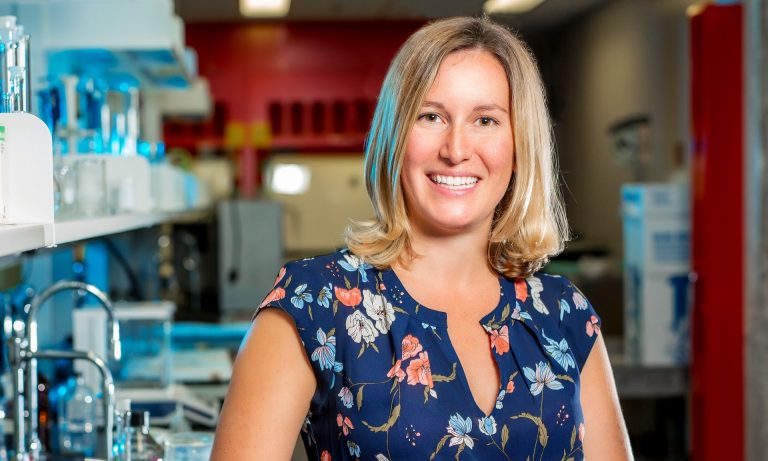Concordia researcher seeks to improve wastewater decontamination

October 8, 2019, is Ada Lovelace Day. Named after the pioneering 19th-century English mathematician, the day is an opportunity to shine a global spotlight on the role of women in science, technology, engineering and mathematics (STEM) research.
Ashlee Howarth is an assistant professor of chemistry and biochemistry in Concordia’s Faculty of Arts and Science. In 2018, she was included on the Forbes “30 under 30” list in the category of science for her contributions to research in wastewater treatment and the detoxification of chemical warfare agents. She also recently won the UBC Chemistry Young Alumnus Award.
At Concordia, with a team of 15 undergraduate, graduate and visiting researchers, Howarth focuses on the design and synthesis of rare-earth metal-organic frameworks targeting applications in wastewater remediation and chemical sensing.
She discusses what led her to this field of research and offers tips for young women beginning their careers in STEM.
Young women and girls need positive role models
What was the academic path that drew you to Concordia, and what is it about the university that is most helpful in terms of your research?
I took a fairly traditional academic path to Concordia. I completed my undergraduate honour’s degree in chemistry at Western University in 2009, and my passion for scientific research has continued to grow throughout my PhD, postdoc and now faculty position. Concordia has given me the opportunity to live out my dream of leading my own research team.
In terms of my research, being at Concordia has given me the chance to work with amazing students. My research program would not be possible without the hard work, dedication, motivation and creativity of my undergraduate and graduate students. Their passion and enthusiasm for chemistry reminds me why I wanted to become a faculty member in the first place.
I may be biased, but I truly believe Concordia has the best students in the world, and I feel lucky to be able to work with them.
Tell us about your research into wastewater treatment.
My research group works with a class of porous materials known as metal-organic frameworks, or MOFs. The easiest way to think about MOFs is to compare them to sponges, except MOFs can be designed and tuned on the nanometre scale. We are particularly interested in designing these MOFs to be utilized in wastewater remediation and treatment applications.
Traditional municipal wastewater treatment can miss low-level contamination from things like antibiotics, medication and cholesterol. Although low concentrations are generally safe for human consumption, not much is known about the combined or additive effects of these contaminants in our water, especially over time.
We are working ahead of the curve to design absorbent materials capable of removing these contaminants from water.
What do you find your students are taking away from the work?
My students and I learn something new every day. Working at the forefront of materials discovery can be challenging, but every challenge presents an opportunity to learn and contribute knowledge to the field.
I think my students are taking away many different things, both on a personal and professional level, while gaining hands-on experience with a wide variety of scientific techniques. They are also learning to read scientific literature with a critical eye, to help them when they face a roadblock in their research.
I think they have also learned that, in reality, research is full of failure and it takes time to bring a research project from start to finish.
I think with every achievement, they gain confidence in themselves as researchers and scientists. They also learn about the challenges and rewards that come from working in a team environment.
Why is it important to promote women’s careers in STEM? What has your own experience been like?
I think many researchers in STEM deal with imposter syndrome, myself included, but feeling supported helps to minimize those feelings.
Support can come in many different forms, from many different sources, and it can help to give researchers the confidence and reassurance we need to succeed.
It is also important for young women and girls to have positive role models. By promoting the careers of women in STEM, we increase the visibility of a new pool of role models that people can identify with. The same goes for any traditionally underrepresented group in STEM.
I have had a lot of support from mentors and colleagues throughout my career. Having mentors who believed in me, even when I did not always believe in myself, is a huge reason why I am here at Concordia. Even though I met my mentors at different stages of my undergraduate, graduate, postdoc and faculty career, they all continue to support me, even years down the road and from different cities across Canada and the United States.
In addition to mentors, it has been incredibly helpful to have supportive peers and colleagues who I have been able to relate to and who have helped me navigate my way through research and life challenges.
Howarth’s current research is funded by NSERC, FRQNT and the Department of National Defence.
Find out how to study chemistry and biochemistry at Concordia.




